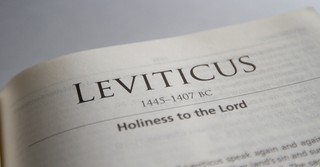Why Should We Bother Reading Leviticus?
Share

Leviticus is the third book of the Pentateuch, the first five books of the Bible, written by Moses. Together, they tell the story of the nation of Israel, the chosen people through whom the Savior would come. It’s an often-overlooked book, relegated as “not relevant” to those of us who live under the New Covenant of Christ’s blood. But by neglecting to read and study it, we are missing out on a great deal of insight into the character and nature of God.
Many a devoted follower of Christ has been derailed in their goal of “reading through Scripture” by the book of Leviticus. My husband says, “It’s when I get to the part about ‘rashes’ that I tend to move on to another part of the Bible!” As Gentiles, we are far removed from the intricate details of animal sacrifices that provided a way for God to dwell among His people before Christ came. Yet this is not a reason to avoid Leviticus.
Here are five reasons we ought to read and appreciate this difficult book as a regular part of our Bible study.
Photo credit: ©SparrowStock
1. Leviticus Reveals the Value of all Scripture

“You, however, continue in the things you have learned and become convinced of, knowing from whom you have learned them, and that from childhood you have known the sacred writings which are able to give you wisdom that leads to salvation through faith which is in Christ Jesus. All Scripture is inspired by God and profitable for teaching, for reproof, for correction, for training in righteousness; so that the man of God may be adequate, equipped for every good work” (2 Timothy 3:14-17).
What were the things Timothy had learned? His father was a Gentile (Greek), but his mother Eunice and grandmother Lois were Jewish believers (Acts 16:1; 2 Timothy 1:5). When he was a child, the New Testament had not yet been written; the “sacred writings” Paul refers to included Moses (the Pentateuch), the Psalms and books of wisdom, and all the prophets. Knowing the Levitical laws of sacrifice and worship gave him a strong spiritual foundation and unique insights into God’s character, as well as an understanding of the necessity of atonement for sin.
When Jesus appeared, God enlightened his mother and grandmother’s heart to see the Messiah as the fulfillment of the shadows found in the old covenant given to Moses, and the Scriptures led them to salvation. All Scripture is inspired; God preserved Leviticus for us to learn from just as much as He inspired its original writings for the Old Testament saints.
“Now these things happened to them as an example, and they were written for our instruction, upon whom the ends of the ages have come” (1 Corinthians 10:11).
Photo credit: ©SparrowStock
2. Leviticus Reveals Jesus

“And beginning with Moses and all the Prophets, he explained to them what was said in all the Scriptures concerning himself. … He said to them, ‘This is what I told you while I was still with you: Everything must be fulfilled that is written about me in the Law of Moses, the Prophets and the Psalms’” (Luke 24:27, 44).
Bible scholars estimate conservatively that Jesus fulfilled over 300 Messianic prophecies. He also quoted extensively from the Old Testament scriptures, clearly identifying Himself as the One about whom the Scriptures spoke. Hebrews, the complimentary New Testament book to Leviticus, explains that Jesus is God’s “final word,” after speaking through the prophets, in many ways (Hebrews 1:1-3).
While reading Leviticus, one finds the word “blood” mentioned sixty-six times, primarily connected to the blood sacrifices required for the atonement of the people. The prescribed sacrifices all point to the once-for-all sacrifice that Jesus would make for the sins of the world. In Leviticus, God established the order of the priesthood for the children of Israel, a shadow of what was to come. In Hebrews, we learn that Jesus is our eternal, perfect High Priest who always lives to make intercession for us, the substance of the shadow (Hebrews 2:17; 3:1; 5:5-6;7:23-28).
“For what I received I passed on to you as of first importance: that Christ died for our sins according to the Scriptures, that he was buried, that he was raised on the third day according to the Scriptures” (1 Corinthians 15:3-4).
Photo credit: ©Getty Images/udra
3. Leviticus Reveals the Holiness of God

“Then the Lord spoke to Moses, saying: “Speak to all the congregation of the sons of Israel and say to them, “You shall be holy, for I the Lord your God am holy” (Leviticus 19:1-2).
“Thus you are to be holy to Me, for I the Lord am holy; and I have set you apart from the peoples to be Mine” (Leviticus 20:26).
Leviticus outlines God’s requirements for how He was to be worshipped as the priests carried out the many sacrifices meant to atone for the people’s sin. More than any other attribute, Leviticus reveals God’s holiness.
The word “holy” is used seventy-seven times in Leviticus; “cleanse/cleansed/cleansing” is used twenty-five times; “clean” is used thirty-eight times; and the word “unclean/uncleanness” is used ninety-two times. God gave detailed, specific instructions to Aaron on how they were (and were not) to behave during the times of their service in the tent of meeting, “so as to make a distinction between the holy and the profane, and between the unclean and the clean” (Leviticus 10:10). The laws God established had serious consequences; to take them lightly and treat God with a lack of fear and respect was to risk death.
God desired to dwell with His people, but their sin was a barrier, offensive to His perfect holiness. He established the intricate system of the Levitical priesthood with the accompanying sin offerings as a temporary covering for His people, until the time came for Jesus to do away with sin completely. This allowed the children of Israel to enter into God’s presence as long as they were covered by the shed blood of the sacrifices.
God is unique. No other false “god” claims relationship with its worshippers, but God desires to be present with the people He created, including those of us who live on this side of the cross. We, too, are called to be a holy people, just as the children of Israel were. We are to be set apart from ungodliness and worldliness, made holy by the blood of Christ and learning to walk in fellowship with Him. Leviticus helps us understand just how holy God is, and to be grateful for the imputed holiness we receive in Christ.
“But you are a chosen race, a royal priesthood, a holy nation, a people for God’s own possession, so that you may proclaim the excellencies of Him who has called you out of darkness into His marvelous light” (1 Peter 2:9).
“As obedient children, do not be conformed to the former lusts which were yours in your ignorance, but like the Holy One who called you, be holy yourselves also in all your behavior; because it is written, ‘You shall be holy, for I am holy’” (1 Peter 1:14-16).
Photo credit: ©Getty Images/momnoi
4. Leviticus Reveals the Nature and Character of God

“Rather than try to practice the old ceremonies or look for some deeper spiritual significance in them, the focus should be on the holy and divine character behind them. This may partly be the reason that explanations which Moses often gave in the prescriptions for cleanness offer greater insight into the mind of God than do the ceremonies themselves. The spiritual principles in which the rituals were rooted are timeless because they are embedded in the nature of God.” (John MacArthur)
John MacArthur sees two clear divisions in the book of Leviticus. For the children of Israel living under the Law of Moses, chapters 1-16 explain how to have personal access to God through appropriate worship. The rest of the book (chapters 17-27) details how to be spiritually acceptable to God through an obedient walk. As he states in the quote above, our focus should be on the holy and divine character of God – the nature of God revealed in the requirements He set upon His people.
All of the New Testament teaches that Christ fulfilled the Law. The old covenant built on the sacrifices of bulls and goats that could never remove sin was done away with and replaced permanently by the perfect blood of Jesus shed on the cross (Hebrews 10:1-44). The sacrifices may have changed, but the immutable character and nature of God remains the same. God’s just and righteous nature are revealed in Leviticus; the animal sacrifices made possible the forbearance of God in passing over the sins previously committed until Jesus came (Romans 3:25).
The principles of how we worship and how we walk in obedience to God also remain today. God is to be revered, feared, honored, and treated with awe and respect as we come into His presence. Jesus took the principles of obedience found in the Law given to Moses and elevated them from duty-driven, outward obedience to matters of the heart (Matthew 5-7). When we read Leviticus, we are reminded that God takes our behavior, attitudes, and words seriously, and inspires us to use our freedom from the Law to live holy and set apart, reflecting the image of Christ that is being formed in us.
“Now the Lord is the Spirit, and where the Spirit of the Lord is, there is liberty. But we all, with unveiled face, beholding as in a mirror the glory of the Lord, are being transformed into the same image from glory to glory, just as from the Lord, the Spirit” (2 Corinthians 3:17-18).
Photo credit: ©Getty Images/mbolina
5. Leviticus Reveals Christ as It Unfolds God’s Plan for the Ages

“Clean out the old leaven so that you may be a new lump, just as you are in fact unleavened. For Christ our Passover also has been sacrificed” (1 Corinthians 5:7).
There is a hidden gem in the book of Leviticus that brings hope and encouragement to all believers. Leviticus 23 outlines the seven feasts, the religious festivals that God established for the nation of Israel. These feasts were established as “perpetual statutes” throughout the generations. Together, they are a prophetic timeclock for God’s plan for the ages, given as special times of remembrance and celebration for God’s chosen people.
The seven feasts are Passover, Feast of Unleavened Bread, First Fruits, Pentecost, Feast of Trumpets, Day of Atonement, and Feast of Booths. The New Testament is clear that four of the feasts have already been prophetically fulfilled in Christ. Jesus fulfilled the first three feasts at His first coming, with His death, burial, and resurrection (1 Corinthians 5:7-8; 15:20-23). Pentecost was fulfilled fifty days after Christ’s resurrection and ten days after His ascension, when the Holy Spirit descended on the disciples and the church age began (Acts 2:1-4).
Many Bible scholars believe the last three feasts will be fulfilled at Christ’s second coming, anticipating His return at the Feasts of Trumpets, judgment of the nations on the Day of Atonement, and the prophesied Millennial kingdom fulfilling the Feast of Booths when God once again dwells with His people.
Six times in Leviticus 23 we read the phrase “appointed times.” God is never random nor haphazard. As we ponder the sovereign mind of God, the details of these feasts come alive to us even in the twenty-first century, causing us to look upward in anticipation of our Savior’s soon appearing. There is a blessing and reward for those who read this difficult book.
Let us be diligent to study all of God’s Word, trusting the Holy Spirit to enlighten our understanding and grow our faith in the God who has preserved it for us.
Photo credit: Unsplash/Malvestida Magazine
Author Sheila Alewine is a pastor’s wife, mother, and grandmother of five. She and her husband lead Around The Corner Ministries, which serves to equip Christ-followers to share the gospel where they live, work and play. She has written seven devotionals including Just Pray: God’s Not Done With You Yet, Grace & Glory: 50 Days in the Purpose & Plan of God, and her newest one, Give Me A Faith Like That, as well as Going Around The Corner, a Bible study for small groups who desire to reach their communities for Christ. Their ministry also offers disciple-making resources like One-To-One Disciple-Making in partnership with Multiplication Ministries. Sheila has a passion for God’s Word and shares what God is teaching her on her blog, The Way of The Word. Connect with her on her blog, Facebook, and Instagram.